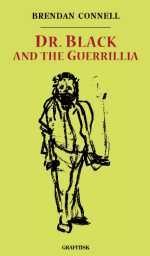 By BRENDAN CONNELL (Grafitisk; 2005)
By BRENDAN CONNELL (Grafitisk; 2005)
Brendan Connell continues to impress me with his range and intelligence. This wildly satiric and surreal novella, a handsomely printed limited edition hardcover, is essentially uncategorizable, reading like some mutant hybrid of Raymond Roussel and David Foster Wallace but still very much its own inscrutable beast.
It’s one of several Connell tales centered on the character of Dr. Black, “polymath and great phytographist, foremost of amateur nephologists.” An opening page footnote informs us that the doctor is currently stationed in San Corrados, where he’s searching for the Yaroa tribe so he can document their religious practices. Black’s quest takes him into a jungle thicket where he’s robbed and nearly devoured by an anaconda.
Rescued by two members of the very tribe he’s searching for, Black imbibes the “sacred semen of the sun” (deciding that “sometimes one must lay aside the microscope and look through the kaleidoscope”). Under its influence he meets a deity who identifies itself as Nuxi in the “Heaven of Metanatural History,” where “all the non-material parts of Earth’s imminent scientists are kept for both study and display.”
From there Dr. Black is kidnapped by guerrillas and inducted into their revolutionary crusade. This entails much assorted mischief, a dash through some exotic caverns and the eventual overthrow of the president of San Corrados. All seems to be going well for the revolutionaries until the region is hit with never-ending rain storms, resulting in mass flooding and waves of mud; in the melee several mummies are swept from the vaults of a museum, floating on the mud sea “like a fleet of vessels arriving from the netherworld.” Luckily Dr. Black catches a flight out before things get too hairy.
In an online “Manifesto of Neo-Decadence,” Brendan Connell proclaims that “Slick writing should be tossed out like men with sweaty hands, mass-produced objects, and food in Styrofoam cups.” That sentiment is very much in evidence in DR. BLACK AND THE GUERRILLIA, which frequently and unexpectedly switches style, tone and focus. It is, however, a thoroughly enjoyable romp with (in the Nuxi passage) some of the most powerful hallucinatory prose I’ve recently encountered.
